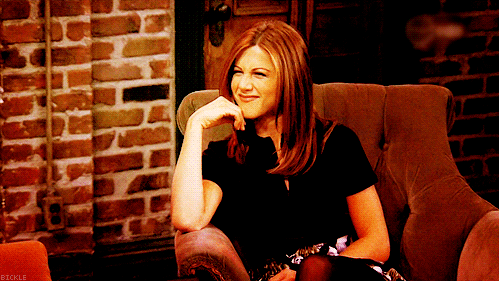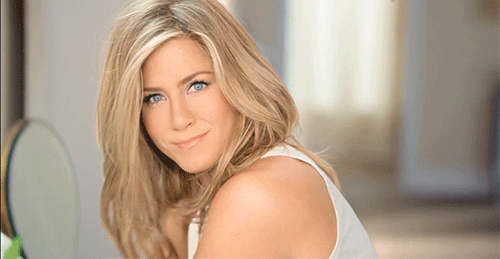In the fall of 1994, I was a new mom, a new wife, and a faithful fanatic of the brand new sitcom, Friends. I looked forward to Thursday night TV all week. I had just turned 21, and after a full day of changing diapers, watching Barney, and reading Shakespeare, I would glue myself to my grandma’s hand-me-down console TV in our first apartment and pretend I was carefree again. I imagined myself, along with my own friends, living it up in Manhattan, drinking from oversized coffee cups, and popping in and out of each other’s apartments. I imagined being thin again, wearing cute clothes, and sitting next to my husband on the couch in Central Perk as we all contributed to the most trivial and inane conversations. I imagined being Rachel.
Rachel Green, played by Jennifer Aniston, was incredibly cute and fairly flawed. She almost let societal expectations undermine her self-worth and forge a path which, for her, meant complacency. But she didn’t. She didn’t go through with a loveless marriage, and she decided instead to make it on her own. She cut up Daddy’s credit cards and went from barista to fashion buyer. With her adorable new haircut that took Gen X-ers by storm, Rachel became somewhat of an icon to young women. This isn’t to say she was a perfect role model. Her spoiled upbringing, episodic bouts of whining, and at times, air-headed nature could set anyone on edge. But she was also kind of real. A young woman questioning privilege, battling her own inflated ego, seeking a way to remain true to herself and true to her friends. Watching her was a fun escape and actually made me contemplate the person I did and did not want to be. Learning about Aniston over the years, or Jen as I like to call her, was even more interesting. Her attitude toward aging, beauty, charity, heartbreak, and motherhood left me in awe. It became clear that it wasn’t Rachel I admired; it was Jen.

Jennifer Aniston wrote an article for The Huffington Post a few weeks ago voicing her frustration over incessant pregnancy rumors. She states, “For the record, I am not pregnant. What I am is fed up.” Jen is 47. You would think there would be a point when people stop prodding her, when they start minding their own business. I know too well they won’t. I imagine when Jen is 65 and I am 61, when our eggs have long since dried up, our friends, families, and co-workers (a.k.a. Mr. and Mrs. Well-Meaning) will ask, “So, when are you having a baby?” Her experience with this is different than mine, obviously. First of all, she’s a celebrity and is under the microscope every day; additionally, she has never had a baby. On the other hand, I’ve had one child and, on many occasions, have been made to feel like a neglectful parent because of my son’s only-child-existence. What unites us is that we are both apparently unnatural. Both freaks in a world that loves labels, and traditions, and categories.

But here is what Mr. and Mrs. Well-Meaning, with all of their questions and concerns, don’t know: You don’t know Jen’s life. You don’t know if she lies awake at night fearing the very idea of motherhood or prays to one day cradle a tiny person of her own. You don’t know if this is a choice that she has been certain of for a very long time, or if she’s infertile, and is in turn, stung by feelings of inadequacy and hopelessness every time you say something. If you are a man, you don’t know what carrying a baby for nine months does to a person. How a little piece of your heart is taken from you, leaving you a helpless bystander to a part beautiful, part cruel world that you hope will be kind and fair, but you know is certain to incite pain. You don’t know if her ovaries burn every time she holds a baby or if each day crossed off the calendar is another reminder of a window that inches closed, just a little bit more. You don’t know if she swallows down the pangs of envy whenever her friends send her beautiful holiday cards of fresh, toothless smiles. You don’t know if she cries at night. You don’t know if she has regrets. And, Mr. and Mrs. Well-Meaning, with all your good and kind intentions, you obviously don’t know about filtering your mouth.
 via Aveeno
via Aveeno
The funny thing about this life is, it’s supposed to be our own. We’re supposed to be able to decide what’s best for us, pay our bills, and be kind to people without bowing to societal expectations, whether that includes having ten kids or none. When I see Jen in commercials and new movies, exuding confidence with her Aveeno-kissed skin, I feel like a proud little sister. I know it sounds ridiculous; she doesn’t even know I exist. But I like to imagine that when she holds the children at St. Jude Hospital, speaks passionately about her work with orphans in Tijuana, and advocates for LGTB youth, her heart matches my own. Maybe she feels the same way I feel when my only child shares good news with me, when I sense that he’s hurting, when my students come to me with problems, and when they return to me well after they graduate. You see, I know a little secret that Mr. and Mrs. Well-Meaning have never even considered, and they might even gasp to realize… there are many faces to maternal love. They’re just not looking hard enough.
More from BUST

